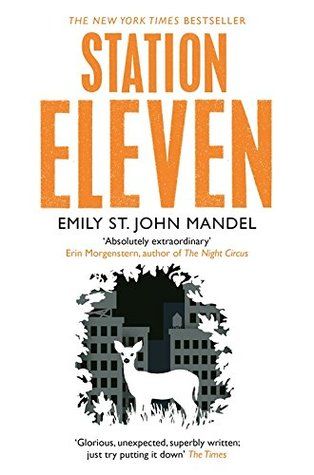
One-Sentence Summary: The ending of a famous actor coincides with the beginning of a new collapsed world.
On one snowy night in Toronto, a famous actor Arthur Leander dies on stage when performing Act 4 of King Lear. On the same night, an outbreak of a swine flu pandemic known as the "Georgia Flu" begins in the hospital after a lady flies into Toronto from Moscow on that morning. Since that night, the world is never been the same again. The collapse of modern technologies such as the Internet, mobile phones, and televisions. Aeroplanes and cars are gradually ceased to be functional due to the ending of gasoline, and people have to travel by foot or by other ancient methods. Essential services such as fire departments, police, road maintenance and garbage pickup are no longer operational.
Twenty years later, Kirsten, who used to be a child actress in the play with Arthur, travels in a caravan with a nomadic group of actors and musicians known as the Travelling Symphony. Kirsten keeps closely the two-volume set of the comics given by Arthur before his death, titled Station Eleven. The troupe arrives at a small town, hoping to reunite with two members that they left behind - Charlie and her husband, Jeremy. Upon arriving, they can't find their friends, and the town is now controlled by a Prophet. The troupe quickly leaves the town after the play. The conductor later reveals to Kirsten that the Prophet is looking for another bride and tells her that he is targeting one of their members.
Then, the story jumps to Arthur's life before the pandemic, from an unknown actor to a superstar and his different relationships. Arthur's first wife is Miranda, the creator of the comic "Station Eleven". On their third anniversary, Miranda finds out that her husband has an affair with one of their dining guests, Elizabeth, who would become his second wife.
Back to the present, the troupe discovers a stowaway in their caravan who flees from being the Prophet's next bride. She tells the troupe that Charlie and Jeremy had left for the Museum of Civilisation, and they decide to go there to find their missing friends. Shortly after, members of the troupe begin to vanish, and finally, the entire trope is totally out of sight, leaving only Kirsten and her friend August.
The story also expands to include Jeevan, a man who has no idea what to do in his life until he performs a CPR on Arthur, which reassures his desire to work as a paramedic. He is warned that night about the deadly virus by his best friend, a doctor in Toronto. He chooses to stock up on supplies and goes to stay with his brother. Around that time, Arthur's best friend, Clark, is flying to Toronto from New York to attend Arthur's funeral. Coincidentally, Arthur's second wife Elizabeth and her son Tyler share the same flight with Clark, but the flight has to be grounded due to the pandemic.
Reading anything about pandemic outbreaks written before 2020 seems unreal and indescribable. It's like a reflection that brings the readers back to the beginning of the pandemic, where some people were optimistic about the situation and believed that the outbreak would be just temporary, like the SARS. The outbreak affected the hospital staff and caused a shortage of beds. Some people get well-prepared with food supplies, but some still deny the virus's existence. I wondered whether the denial is due to egoism, believing that there is nothing humans can't control, but when the situation is out of their hands, they refuse to accept the reality of the change.
The timeline can be jumpy among the main characters, switching between pre-pandemic and their lives after the outbreak. If you read it well, you will realise that all the main characters' lives are entwined. I have no problem with the writing style. However, there are some parts in which the author lingered too long on it, and I started to get impatient, wondering about the relevance to the story. Aside from that, I liked how the author portrays the different attitudes of the various characters in coping with the pandemic, which relates to what we have been experiencing these few years. Some people adapted to the new life, but some have swayed to cult beliefs. Some people are realistic about the situation, but some are still hoping for the old world's return. Reading this book made me feel much better about our current world. At least in our world, the cars, trains, mobile phones, Internet, electricity and water supplies are still working well.
ISBN: 9781447268970 (Paperback)
Number of Pages: 339
Rating: ★★★ (3/5)
More reviews can be found on:
- Goodreads: Station Eleven by Emily St. John Mandel.
- The Storygraph: Station Eleven by Emily St. John Mandel.